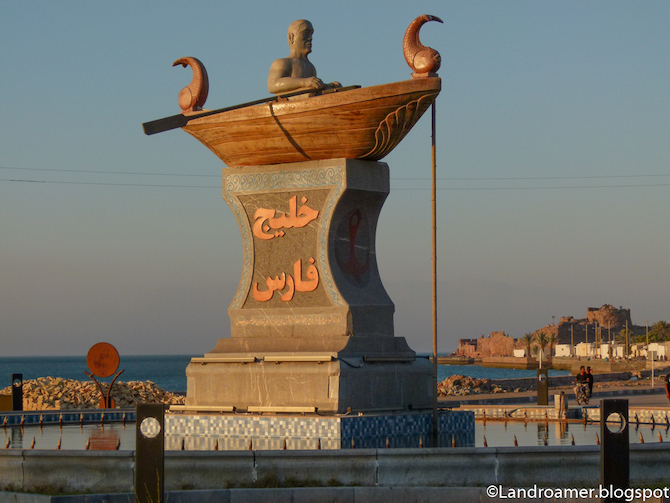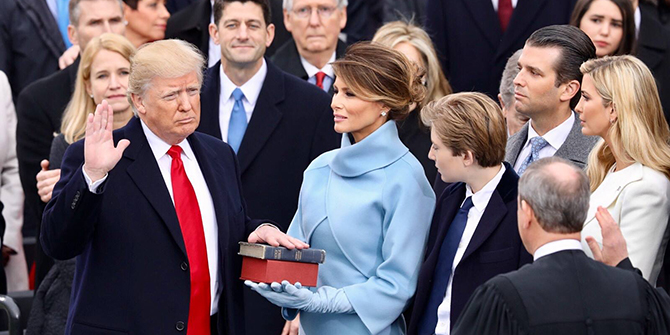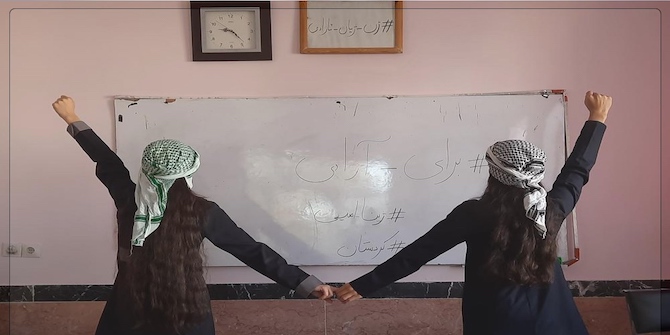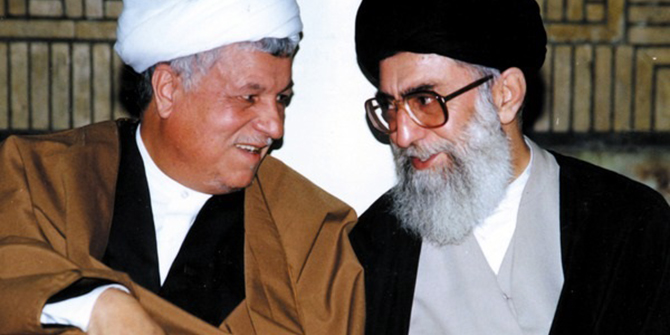by Ghoncheh Tazmini

‘National Persian Gulf Day’ is celebrated in Iran on the 10th of Ordibehesht in the Iranian calendar (29–30 April). The day marks the anniversary of Shah Abbas of Persia’s (1571–1629) success in ousting the Portuguese from the island of Hormuz in the Persian Gulf in 1622. A mighty seaborne empire – one that was ‘written on water’, the Portuguese Maritime Empire occupied the island for over a century, commanding the passageway of all shipping entering and leaving the Persian Gulf between 1515 and 1622.
A strategic nodal point in a network of Portuguese staging posts, Hormuz was singled out as the main distribution centre of intercontinental trade. Such was the splendour of Hormuz that a Persian proverb referred to the entrepot as a jewel: ‘Were the world a ring, Hormuz would be the jewel in it’. Ahead of its time, the cosmopolitan island was characterised by religious diversity. ‘God was celebrated four times a week: the Hindus on Monday, the Moors on Friday, the Jews on Saturday and the Christians on Sunday’, reported Father Gaspar Barzeus in 1549.
National Persian Gulf Day has been observed since 2004, affording Iran with an opportunity to celebrate the heritage of ‘khaleej-e fars’, or what European cartographers documented as ‘Sinus Persicus’. As part of last year’s celebrations, an exhibition featuring fifty rarely-seen maps and documents featuring the Persian Gulf was displayed at the Tehran Map Museum. The Sasanian Empire’s mare nostrum since the dawn of the third century BC, the nomenclature of this body of water has become a symbol of ideological conflict between Iran and Arab rivals with competing geopolitical agendas.
However, the pretext for these commemorations are not questions of genealogy. As the Tehran Times reminds us, the celebrations commemorate the ‘exit of colonial and foreign forces from the strategic waterway’. The Iran Review refers to the military campaign that drove ‘the Portuguese colonial forces out of the Strait of Hormuz’. In the 2011 celebrations, the Tehran Times explained that the 50-metre-long Iranian flag that was hoisted over the port city of Bushehr represented a ‘symbol of the Iranian nation’s dignity and glory and their campaign against colonialism’.
If we strip dogma, nationalist sentiment, and historical legend from historiography, then neither Hormuz nor Safavid Iran were colonised during the Portuguese occupation. The singular narrative is that the Portuguese takeover of Hormuz was the harbinger of a long pattern of Western interference in Iran’s political destiny. By historicising the Portuguese presence in the Persian Gulf, my research interrogates the myth that Iranian-Western antagonism is so deeply embedded in history that is almost preordained. Let us consider the Anglo-Persian pact, which ties into the historical episode under consideration.
In the rhetoric surrounding this anniversary, there no reference to what Portuguese chronicler, Luciano Cordeiro referred to as the ‘Convenio Anglo-Persa’ (the Anglo-Persian Pact). There is no mention that the naval operation against the Portuguese was a joint Anglo-Persian campaign. This was one of the first episodes in which a Muslim, non-European power, was assisted militarily by a European power, against another European power. The Safavid Shah, lacking a navy, requested assistance from the East India Company in seizing Hormuz in return for concessions along the Persian Gulf.
The collaboration is even more intriguing if we consider that Portugal and England boast the ‘oldest diplomatic alliance’, or the ‘ancient alliance’, with reference to the Treaty of Windsor, a pact of mutual support signed in 1386. In a speech in the House of Commons in 1943, Churchill famously described the friendship between England and Portugal as an alliance ‘without parallel in world history’. The pact was clearly breached when the English opted to assist the non-European, non-Christian, Safavid Shah in expelling the mighty European maritime power from the island.
Safavid court chronicles do not mention that English efforts to get favoured commercial status were systematically rebuffed. As the Persian memory of naval assistance wore off, English presence was only tolerated to the extent that it was purposeful – English vessels were used to ship envoys and merchandise, while English armed ships served as a deterrent against Omani marauders in the Persian Gulf. As Rudi Mathee underscores, the English position in the Persian Gulf and mainland Iran dispels the anachronistic myth of English interference in Iran’s domestic affairs dating back to the Safavid era.
While Iran’s modern history has been punctuated with episodes of Western meddling, we cannot lump the Luso-Iranian encounter in the sixteenth and seventeenth centuries as part of one big bundle of infelicitous encounters with Western powers. There is a tendency to conflate, and to confuse, colonial expansion with pure, profit-driven mercantilism – as was the case of the Lusitanian holding of the Hormuzian emporium.
The Portuguese had avowedly imperialist and mercantilist agendas, but while historians have pointed to European dominance in some such relationships, there is ample evidence that the Portuguese acted in concert with, and not isolated from, the Hormuzians and the Safavids. Political motives were clearly at play with Luso-Persian diplomatic exchanges and interactions designed to foster a grand anti-Ottoman alliance. The Safavids were not simply victims of the Portuguese imperial project but active protagonists.
Without airbrushing or glossing over the brutality and the profoundly disturbing effects of the Portuguese occupation, the Persian-Portuguese encounter reflects the interconnectedness of two distant continents. Portuguese contacts in the Strait of Hormuz, and its linkages with Safavid Iran and the diverse peoples intersecting the island of Hormuz, heralded a new transcontinental, transoceanic, and transnational age of globalisation, characterised by commercial, strategic and cultural interaction and interdependence. Thus, the history of Portugal and Iran in the early modern period is really the history of Portugal in the world, and of Iran in the world.
National Persian Gulf Day should commemorate the heritage of the Persian Gulf rather than reinforce and reify narratives that only serve to widen the gulf between Iran and the West. The Persian-Portuguese past and the Hormuzian geopolitical theatre allow us to transcend reductive notions of history and to challenge the assumption that there is a deeper historical genealogy of conflict with the West.







I have recently presented a research paper at the Local Seminar held by Goa Archives, Goa, India …. entitled
“Sulphur Trade in the Estado da India for the manufacture of Gunpowder at the ‘Casa de Polvora’, Goa”. It deals
predominantly with the history of the trade of Persian sulphur brought by the Portuguese Armadas to Goa. The
period covered is c. 1622 to 1728. It has interesting comments on the contemporary events, very often on the
same topics as related above. So far as I know, this is first attempt, as no historian has written on this topic. It
is based on original manuscript documentation in Portuguese. This paper is going to be published Goa Archives.
I wish the author good luck for further research.
History united Portugal and Iran, enriching the culture of their peoples.